(The Mass Media is proud to present an interview in two parts with UMB alum Dennis Lehane, Boston boy and author of the popular Kenzie-Gennaro mystery novels. His last book, Mystic River, is a departure from the genre and established him as a serious urban novelist. Mystic River has been made into a movie by Clint Eastwood and is due out in October. A star on the rise, we thank Mr. Lehane for his time and his candid answers)
Carl Brooks: Let’s get the topical stuff out of the way: How did you end up at UMB and where did you go from there?
Dennis Lehane: The honest answer? It was within walking distance of my house and a lot of my friends were going there. I went for a year and majored in English long enough to realize that I didn’t enjoy talking about books; I wanted to write them. So I found a tiny school in St. Petersburg, Florida, Eckerd College, with a good creative writing program and lots of scholarship money to throw around, and I transferred there.
CB: How important was your education as a writer?
DL: My education was hugely important. I guess the argument could be made that I would have gotten where I am without formal training because I was so hungry and so determined, but I would’ve gotten there a lot slower. A formal education probably saved me ten years, easy. But it was also a case of having the right attitude. I was smart enough to realize that I knew nothing. Zero. So I parked my ego at the curb and I chose to study with writers whose work I respected, and who also had reputations for being demanding teachers, and I pushed all dreams of publishing out of my head and just worked my ass off trying to grasp the craft and get good. Getting good and getting published are two different ambitions; I can’t overstress that. Now that I’m a teacher, I can usually identify students who have a chance of making it as published writers based on which of those ambitions they bring into class with them.
CB: You quite accurately catch the voice and character of Boston. Do you have to work hard to put that unmistakable flavor in the writing, or is it natural?
DL: Whenever I finish a first draft, my initial instinct is, okay, now I have to go back in and nail the atmosphere. It’s usually at this point that my editor tells me if I put any more atmosphere in, she ís going to fly up here and bludgeon me. So experience has taught me that I have an instinctual grasp for the local flavor I put in the books and the last thing I should do is overthink it. But that instinct, I’m positive, came from studying the great urban novelists at whose church I worshipped in my teens and twenties: James T. Farrell, Hubert Selby, William Kennedy, Pete Dexter, Elmore Leonard, and, most importantly, Richard Price, and seeing how they employed a ‘less is more’ attitude in that regard.
CB: Your first book, A Drink Before the War, seemed to outright mock some key political figures in Boston- was that deliberate?
DL: There is a politician who won’t talk to me because he thinks I based one of the pols in that book on him. Funny thing is, I didn’t. But I certainly have a deep mistrust of politicians that pervades all my work. I mistrust anyone who smiles too much, I guess. Which is one of the reasons I’ve always like Tom Menino; sure, he swims in those waters, but he seems much more up front about the realities of it than most, and I honestly think he ís a good man in a tough job. Tip O’Neill struck me that way, as did Brian Honan, the Brighton city councilor who died last year. But the majority of politicians strike me as no different than middle managers in insurance companies. Rather gutless, hollow, waiting for the prevailing wind to tell them which way to blow. Tommy Finneran strikes me as a perfect example of the worst in politics; he seems to have conveniently forgotten that we pay his bills. We heat his house. He works for us. The sooner people get their head around that idea in this city and country, the better it’ll be. Politicians are our employees. We, the people, are the corporate board–and if those employees don’t do their job, or think their interests are above those of the corporation, I say, fire their asses.
(Read more of Dennis Lehane’s views on Boston, writing, and Hollywood next week!)





















































